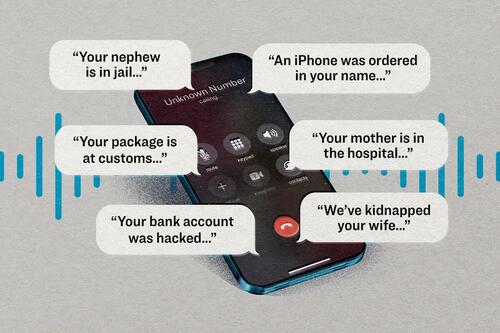
Authored by Katie Spence via The Epoch Times (emphasis ours),
A woman receives a phone call saying her nephew has been arrested and urgently needs bail money. They arrange for a "bail bondsman" to come to her house to collect $29,000 in cash.

The following day, after another urgent call, the bondsman again turns up at her house, attempting to collect an additional $10,000 in cash for "bail."
Instead, he's arrested.
That's just one incident that occurred in Sykesville, Maryland, in 2020. Michael Odell Anderson, who posed as the bail bondsman, has since pleaded guilty to conspiring to persuade multiple elderly victims to put up thousands of dollars under false pretenses, the Department of Justice (DOJ) said.

In total, Mr. Anderson and his co-conspirators scammed at least 49 victims out of more than $842,000—of which $578,170 hasn't been recovered. Mr. Anderson is scheduled to be sentenced on March 21, 2024.
Mr. Anderson and his co-conspirators often told victims that the money they handed over would be returned to them at a later date, according to court documents.
They also often told victims that "there had been a 'gag order' placed on the case requiring secrecy and that the victim could not share the information with others," the DOJ stated.
About a year ago, Lindy Wise, a web designer and all-around technology aficionado in her 60s, received a text saying her Social Security payments had changed, and if she wanted to see why, to "click here."
"It was very well done," Ms. Wise told The Epoch Times. However, at the last minute, she said that something didn’t feel right, and she decided not to click the link.
"You know, when you walk out your front door and you get in your car to go anywhere, you're walking downtown, you have to be aware of what's around you and be alert," Ms. Wise said.
"Now, we have to be just as alert online. I get messages all the time—usually several times a week. And I'm in the tech industry, so I know what to look for, but wow. These guys know the elderly are vulnerable. We're less familiar with the technology, and our generation is more trusting. Sometimes, we're alone, and we're lonely. So, we're vulnerable to various types of scams."
The type of scam attempted on Ms. Wise is called "smishing," Ally Armeson, executive director of programs for the Cybercrime Support Network (CSN), told The Epoch Times.

CSN is a nonprofit organization that provides training, develops resources, and works within law enforcement and consumer protection ecosystems to help victims recover after they've experienced a cybercrime.
"With regard to phone scams ... some examples are a robocall (calls delivering a prerecorded message), text messages (smishing), or just a 'live' phone call with a person," Ms. Armeson said.
"As far as smishing, all of us get those supposed texts from Amazon, or a bank, etc., telling us about suspicious activity that will result in our accounts closing unless we reset our password at the provided link.
"Most of the time, we can tell the link is not official, but if a person is in a hurry or distracted, they may click on the fake link and give their login credentials away. Distraction can really get us into trouble. Scammers know we all get distracted—and those smishing texts are an easy, low-effort way to get people's information and steal money."
Ms. Armeson said that while smishing scams are prevalent and often effective, the scams that consumers fall for most often are "imposter scams."
They're also some of the most traumatic for victims.
"With enough research and preparation, cybercriminals can very convincingly pretend to be anyone—someone from a government agency, a family member or friend, a potential love interest—especially now that they have generative Artificial Intelligence at their disposal," Ms. Armeson said.

"We had a romance scam victim who, after reporting the incident, was threatened by the scammer in multiple phone conversations. The scammer said he was going to come to her house to harm her.
"What made this more frightening was that the victim lived alone and was legally deaf. While the police assured the scam victim that the cybercriminal was located outside of the United States and that the victim was not in harm's way, the victim couldn't help but be frightened, especially at night.
"The individual became so stressed that they considered giving up their independent living situation."
The Rise of Phone Scams
The Federal Trade Commission (FTC) received 1.2 million complaints about robocalls in fiscal year 2023.
In 2022, adults older than 60 reported more than 88,000 complaints to the FBI's Internet Crime Complaint Center (IC3), with losses totaling more than $3.1 billion—an 84 percent increase compared to 2021, the FBI reported.

Victims ages 50 to 59 reported losses totaling a little more than $1.8 billion, and nearly 95,000 victims ages 30 to 39 reported more than $1.2 billion in losses.
A separate report by the American Association of Retired Persons, which included data from more agencies, found that elder financial exploitation costs victims ages 60 and older more than $28.3 billion, annually.
"The reality is that older adults usually have more money saved [for] retirement, and so they are more 'profitable' targets," Ms. Armeson said.
"A scammer will put more time and effort into a scam if they think they will get more money, so our older population may be hit with more thoughtful or elaborate scams.
"Some of these scams can get pretty complex, and the scammers are good at getting people anxious or scared by saying things like, 'Your account has been hacked/compromised,' 'You owe money,' 'You will lose benefits.'"
Ms. Armeson cautioned that while the elderly are increasingly targeted, so are younger generations.
"Access to personal information through social media is helping scammers target everyone," she said. The FTC says young people are losing money to scams at a higher rate than those older than 70.

Cathy Wilson, a licensed professional counselor at LifePaths Counseling Center and author of the book, "The Emotional Impact of Being Scammed and How to Recover," concurred.
"Perhaps a good way to think about who scammers target is that they target people with some kind of vulnerability," she told The Epoch Times.
"Many scams target older people who haven't had the experience with technology that younger populations have. That's a vulnerability. Other age groups have different vulnerabilities."
Ms. Wilson pointed to a report by the Better Business Bureau, which shows that scammers often target adults ages 18 to 24 in "fake check scams." That's when an “employer” gets the victim to deposit a check and transfer the funds.
Once the victim realizes that the check isn't real, they already owe the transferred funds to their bank, and the scammer has their money.
Such was the case for Karl, no last name given, who jumped at the chance at what he thought was a legitimate job—evaluating customer service at retail stores.

"They wanted me to be a 'mystery shopper,'" Karl told the Financial Industry Regulatory Authority (FINRA).
"You get this check for $2,950, you text them saying 'assignment received.' And then you go ahead and deposit the check in your bank, and you send them [the scam employer] a text saying 'funds are deposited.'
"You wait until the check is cleared before you go do any shopping—so I figured, well, OK, this is not a scam."
FINRA said the scammers told Karl to then "quickly go to a series of stores to send money orders totaling $2,600 to specific addresses provided by the company" and to provide feedback.
"Karl's new employer stressed that he needed to fulfill the assignment as quickly as possible. He was told to keep the remaining $350 for completing the task," FINRA stated.
However, the check was fraudulent, resulting in Karl wiring $2,600 of his money to the scammer.
The Better Business Bureau says employment scams are the "riskiest scams for ages 18–24," followed by online purchase scams and cryptocurrency scams.
In November, the DOJ seized almost $9 million worth of Tether, a cryptocurrency that had been used to scam more than 70 victims via romance scams and cryptocurrency confidence scams.
Read the rest here...
Authored by Katie Spence via The Epoch Times (emphasis ours),
A woman receives a phone call saying her nephew has been arrested and urgently needs bail money. They arrange for a “bail bondsman” to come to her house to collect $29,000 in cash.

The following day, after another urgent call, the bondsman again turns up at her house, attempting to collect an additional $10,000 in cash for “bail.”
Instead, he’s arrested.
That’s just one incident that occurred in Sykesville, Maryland, in 2020. Michael Odell Anderson, who posed as the bail bondsman, has since pleaded guilty to conspiring to persuade multiple elderly victims to put up thousands of dollars under false pretenses, the Department of Justice (DOJ) said.

In total, Mr. Anderson and his co-conspirators scammed at least 49 victims out of more than $842,000—of which $578,170 hasn’t been recovered. Mr. Anderson is scheduled to be sentenced on March 21, 2024.
Mr. Anderson and his co-conspirators often told victims that the money they handed over would be returned to them at a later date, according to court documents.
They also often told victims that “there had been a ‘gag order’ placed on the case requiring secrecy and that the victim could not share the information with others,” the DOJ stated.
About a year ago, Lindy Wise, a web designer and all-around technology aficionado in her 60s, received a text saying her Social Security payments had changed, and if she wanted to see why, to “click here.”
“It was very well done,” Ms. Wise told The Epoch Times. However, at the last minute, she said that something didn’t feel right, and she decided not to click the link.
“You know, when you walk out your front door and you get in your car to go anywhere, you’re walking downtown, you have to be aware of what’s around you and be alert,” Ms. Wise said.
“Now, we have to be just as alert online. I get messages all the time—usually several times a week. And I’m in the tech industry, so I know what to look for, but wow. These guys know the elderly are vulnerable. We’re less familiar with the technology, and our generation is more trusting. Sometimes, we’re alone, and we’re lonely. So, we’re vulnerable to various types of scams.”
The type of scam attempted on Ms. Wise is called “smishing,” Ally Armeson, executive director of programs for the Cybercrime Support Network (CSN), told The Epoch Times.

CSN is a nonprofit organization that provides training, develops resources, and works within law enforcement and consumer protection ecosystems to help victims recover after they’ve experienced a cybercrime.
“With regard to phone scams … some examples are a robocall (calls delivering a prerecorded message), text messages (smishing), or just a ‘live’ phone call with a person,” Ms. Armeson said.
“As far as smishing, all of us get those supposed texts from Amazon, or a bank, etc., telling us about suspicious activity that will result in our accounts closing unless we reset our password at the provided link.
“Most of the time, we can tell the link is not official, but if a person is in a hurry or distracted, they may click on the fake link and give their login credentials away. Distraction can really get us into trouble. Scammers know we all get distracted—and those smishing texts are an easy, low-effort way to get people’s information and steal money.”
Ms. Armeson said that while smishing scams are prevalent and often effective, the scams that consumers fall for most often are “imposter scams.”
They’re also some of the most traumatic for victims.
“With enough research and preparation, cybercriminals can very convincingly pretend to be anyone—someone from a government agency, a family member or friend, a potential love interest—especially now that they have generative Artificial Intelligence at their disposal,” Ms. Armeson said.

“We had a romance scam victim who, after reporting the incident, was threatened by the scammer in multiple phone conversations. The scammer said he was going to come to her house to harm her.
“What made this more frightening was that the victim lived alone and was legally deaf. While the police assured the scam victim that the cybercriminal was located outside of the United States and that the victim was not in harm’s way, the victim couldn’t help but be frightened, especially at night.
“The individual became so stressed that they considered giving up their independent living situation.”
The Rise of Phone Scams
The Federal Trade Commission (FTC) received 1.2 million complaints about robocalls in fiscal year 2023.
In 2022, adults older than 60 reported more than 88,000 complaints to the FBI’s Internet Crime Complaint Center (IC3), with losses totaling more than $3.1 billion—an 84 percent increase compared to 2021, the FBI reported.

Victims ages 50 to 59 reported losses totaling a little more than $1.8 billion, and nearly 95,000 victims ages 30 to 39 reported more than $1.2 billion in losses.
A separate report by the American Association of Retired Persons, which included data from more agencies, found that elder financial exploitation costs victims ages 60 and older more than $28.3 billion, annually.
“The reality is that older adults usually have more money saved [for] retirement, and so they are more ‘profitable’ targets,” Ms. Armeson said.
“A scammer will put more time and effort into a scam if they think they will get more money, so our older population may be hit with more thoughtful or elaborate scams.
“Some of these scams can get pretty complex, and the scammers are good at getting people anxious or scared by saying things like, ‘Your account has been hacked/compromised,’ ‘You owe money,’ ‘You will lose benefits.'”
Ms. Armeson cautioned that while the elderly are increasingly targeted, so are younger generations.
“Access to personal information through social media is helping scammers target everyone,” she said. The FTC says young people are losing money to scams at a higher rate than those older than 70.

Cathy Wilson, a licensed professional counselor at LifePaths Counseling Center and author of the book, “The Emotional Impact of Being Scammed and How to Recover,” concurred.
“Perhaps a good way to think about who scammers target is that they target people with some kind of vulnerability,” she told The Epoch Times.
“Many scams target older people who haven’t had the experience with technology that younger populations have. That’s a vulnerability. Other age groups have different vulnerabilities.“
Ms. Wilson pointed to a report by the Better Business Bureau, which shows that scammers often target adults ages 18 to 24 in “fake check scams.” That’s when an “employer” gets the victim to deposit a check and transfer the funds.
Once the victim realizes that the check isn’t real, they already owe the transferred funds to their bank, and the scammer has their money.
Such was the case for Karl, no last name given, who jumped at the chance at what he thought was a legitimate job—evaluating customer service at retail stores.

“They wanted me to be a ‘mystery shopper,'” Karl told the Financial Industry Regulatory Authority (FINRA).
“You get this check for $2,950, you text them saying ‘assignment received.’ And then you go ahead and deposit the check in your bank, and you send them [the scam employer] a text saying ‘funds are deposited.’
“You wait until the check is cleared before you go do any shopping—so I figured, well, OK, this is not a scam.”
FINRA said the scammers told Karl to then “quickly go to a series of stores to send money orders totaling $2,600 to specific addresses provided by the company” and to provide feedback.
“Karl’s new employer stressed that he needed to fulfill the assignment as quickly as possible. He was told to keep the remaining $350 for completing the task,” FINRA stated.
However, the check was fraudulent, resulting in Karl wiring $2,600 of his money to the scammer.
The Better Business Bureau says employment scams are the “riskiest scams for ages 18–24,” followed by online purchase scams and cryptocurrency scams.
In November, the DOJ seized almost $9 million worth of Tether, a cryptocurrency that had been used to scam more than 70 victims via romance scams and cryptocurrency confidence scams.
Read the rest here…
Loading…





